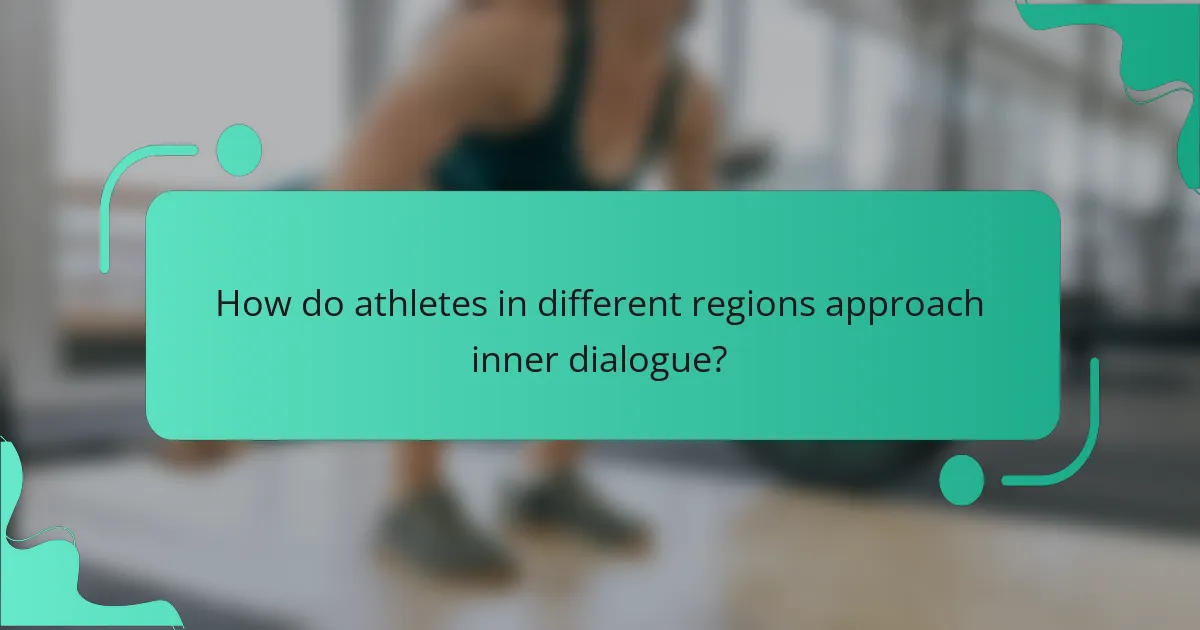Inner dialogue strategies enhance athletes’ confidence and focus through effective self-talk techniques. This article explores positive affirmations, visualization, and reframing negative thoughts. It examines how personalization and cultural influences shape these strategies. Finally, it highlights practical steps for implementing these techniques to improve performance and mental resilience.

What are Inner Dialogue Strategies for Athletes?
Inner dialogue strategies for athletes enhance confidence and focus through self-talk techniques. These strategies include positive affirmations, visualization, and reframing negative thoughts. Athletes can use specific phrases to reinforce their abilities, visualize successful performances, and transform doubts into motivation. Research shows that effective inner dialogue can improve performance and mental resilience, making it a crucial tool in sports psychology.
How does inner dialogue influence athletic performance?
Inner dialogue significantly enhances athletic performance by fostering confidence and focus. Positive self-talk encourages athletes to overcome challenges and maintain motivation during training and competition. Research shows that athletes who engage in constructive inner dialogue report higher self-efficacy and better performance outcomes. Techniques such as visualization and affirmations can help athletes refine their inner dialogue, creating a mental environment conducive to success.
What are the psychological foundations of inner dialogue?
Inner dialogue is rooted in cognitive-behavioural principles, influencing athletes’ confidence and focus. It serves as a self-regulation tool, shaping performance through positive reinforcement and mental imagery. Effective inner dialogue strategies include affirmations and visualization, which enhance motivation and resilience. Research indicates that athletes who engage in constructive self-talk demonstrate improved focus and reduced anxiety, leading to better performance outcomes.

What are the universal attributes of effective inner dialogue?
Effective inner dialogue universally promotes self-awareness, resilience, and motivation. Key attributes include positivity, clarity, and relevance. Positive inner dialogue fosters confidence, while clarity ensures thoughts are focused and actionable. Relevant dialogue aligns with goals, enhancing performance. These attributes are essential for athletes aiming to build confidence and maintain focus during training and competition.
How can positive self-talk enhance confidence?
Positive self-talk significantly enhances confidence by fostering a supportive inner dialogue. This strategy helps athletes focus on their strengths and achievements rather than their weaknesses. By replacing negative thoughts with affirmations, athletes can improve their mental resilience and performance under pressure. Research shows that consistent positive self-talk leads to increased self-efficacy, which is crucial for peak athletic performance.
What role does visualization play in inner dialogue?
Visualization enhances inner dialogue by enabling athletes to create mental scenarios that boost confidence and focus. By vividly imagining success, athletes can reinforce positive self-talk, reducing anxiety and improving performance. This technique allows for the rehearsal of skills and strategies, making them feel more familiar during actual competition. Furthermore, visualization can serve as a powerful tool for goal setting, helping athletes maintain clarity on their objectives and motivating them to achieve their desired outcomes.
How do athletes use affirmations to boost focus?
Athletes use affirmations to enhance focus by reinforcing positive self-talk and building mental resilience. This practice allows them to visualize success and maintain motivation during training and competition. Research indicates that consistent affirmation use can significantly improve performance by reducing anxiety and increasing concentration levels. For instance, a study found that athletes who engaged in daily affirmations reported a 20% increase in their focus during high-pressure situations.

What unique attributes differentiate successful inner dialogue strategies?
Successful inner dialogue strategies for athletes are differentiated by their focus on personalization, positivity, and visualization. Personalization ensures that the dialogue resonates with the athlete’s unique experiences and goals. Positive affirmations enhance self-belief, while visualization techniques create mental imagery of success. These unique attributes foster a tailored approach, promoting confidence and focus during performance.
How does individualized inner dialogue impact performance?
Individualized inner dialogue significantly enhances performance by fostering confidence and focus. Tailored mental strategies help athletes maintain a positive mindset, manage stress, and improve concentration. Research shows that athletes who engage in constructive self-talk experience better outcomes and increased resilience during competition. This personalized approach to inner dialogue allows for unique mental frameworks that cater to individual strengths and weaknesses, leading to improved performance metrics.
What are the specific phrases that elite athletes use?
Elite athletes often use specific phrases that reinforce their inner dialogue strategies, enhancing confidence and focus. Common phrases include “I am strong,” “I can do this,” and “Focus on the process.” These affirmations serve as unique attributes that help athletes maintain a positive mindset and push through challenges. By consistently using empowering language, athletes cultivate a resilient mental state, which is crucial for peak performance.

What rare attributes can enhance inner dialogue strategies?
Rare attributes that can enhance inner dialogue strategies for athletes include visualization techniques, emotional regulation skills, and mindfulness practices. Visualization allows athletes to mentally rehearse performance scenarios, leading to improved confidence. Emotional regulation helps manage anxiety and maintain focus during competition. Mindfulness practices encourage present-moment awareness, reducing distractions and fostering a positive mindset. These attributes uniquely contribute to the effectiveness of inner dialogue, enhancing overall performance.
How can cultural background influence inner dialogue techniques?
Cultural background significantly shapes inner dialogue techniques for athletes by influencing their mindset and approach. Different cultures prioritize various values, such as collectivism or individualism, which can affect how athletes perceive self-talk. For instance, athletes from collectivist societies may focus on team-oriented affirmations, while those from individualistic cultures might emphasize personal achievement. This cultural lens also determines the language and imagery used in inner dialogue, impacting confidence and focus. Understanding these cultural nuances allows athletes to tailor their inner dialogue strategies effectively.
What uncommon practices do top performers employ?
Top performers often utilize uncommon inner dialogue strategies to enhance confidence and focus. Techniques such as visualization, positive affirmations, and self-talk scripts are frequently employed. These strategies help athletes maintain a positive mindset and manage stress effectively. Unique practices include reframing negative thoughts into constructive feedback and using specific cues to trigger optimal performance states. By integrating these methods, athletes can cultivate resilience and improve their overall mental game.

How do athletes in different regions approach inner dialogue?
Athletes in different regions utilize unique inner dialogue strategies to enhance confidence and focus. Cultural influences shape these approaches significantly.
For instance, athletes in Eastern cultures often emphasize collective success, leading to a supportive inner dialogue. They may focus on community and teamwork, which fosters a sense of belonging and shared goals.
Conversely, athletes in Western cultures typically prioritize individual achievement. Their inner dialogue often revolves around personal goals and self-affirmation, promoting independence and self-reliance.
These regional differences highlight how cultural backgrounds can influence the effectiveness of inner dialogue in sports performance.
What challenges do athletes face in developing effective inner dialogue?
Athletes face several challenges in developing effective inner dialogue, including self-doubt, negative self-talk, and external pressures. These factors can undermine confidence and focus. To counteract these issues, athletes must practice positive affirmations and visualization techniques. Consistent training in mental resilience can transform inner dialogue into a supportive tool for performance enhancement.
How can regional sports cultures shape inner dialogue strategies?
Regional sports cultures significantly influence inner dialogue strategies by shaping athletes’ mindsets and self-talk. These cultures instill specific values, beliefs, and expectations, impacting how athletes perceive their abilities and challenges. For example, athletes from cultures that emphasize resilience may develop a more positive inner dialogue, fostering confidence and focus during competitions.
Additionally, unique attributes of regional sports, such as community support and local rivalries, can enhance motivation and self-affirmation. Athletes often draw strength from their cultural identity, which can lead to a powerful internal narrative that reinforces their commitment and mental toughness.
As a result, understanding these cultural influences allows athletes to tailor their inner dialogue strategies, enhancing performance and personal growth.

What are the best practices for implementing inner dialogue strategies?
To implement inner dialogue strategies effectively, athletes should focus on positive self-talk, visualization techniques, and consistent practice. Positive self-talk enhances confidence by replacing negative thoughts with affirmations. Visualization allows athletes to mentally rehearse performances, reinforcing focus and belief in their abilities. Regular practice of these strategies helps create a habit, making them more effective during competitions.
How can athletes create a personalized inner dialogue plan?
Athletes can create a personalized inner dialogue plan by identifying their core beliefs, setting specific goals, and developing tailored affirmations. Start by reflecting on past performances to recognize positive and negative thought patterns. As a result, athletes can focus on enhancing self-talk that builds confidence and concentration. Incorporating visualization techniques and mindfulness practices can further strengthen this inner dialogue, helping athletes maintain a positive mindset during training and competition.
What common mistakes should athletes avoid with inner dialogue?
Athletes should avoid negative self-talk, overthinking, and comparison with others. These mistakes can undermine confidence and focus. Negative self-talk can lead to self-doubt, while overthinking can disrupt performance flow. Additionally, comparing oneself to others can create unnecessary pressure. Instead, athletes should practice positive affirmations, mindfulness, and self-compassion to enhance their inner dialogue.
What expert insights can improve inner dialogue effectiveness?
To improve inner dialogue effectiveness, athletes should focus on positive affirmations, visualization techniques, and mindfulness practices. Positive affirmations build self-belief, while visualization helps mentally rehearse success. Mindfulness enhances focus and reduces anxiety, creating a conducive mental environment for performance. These strategies foster a supportive inner dialogue that boosts confidence and concentration.
